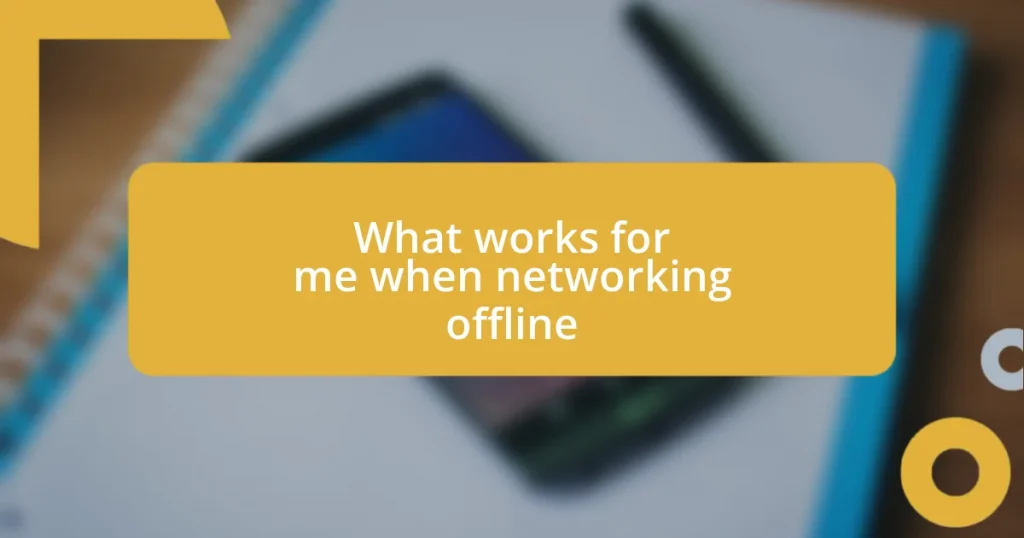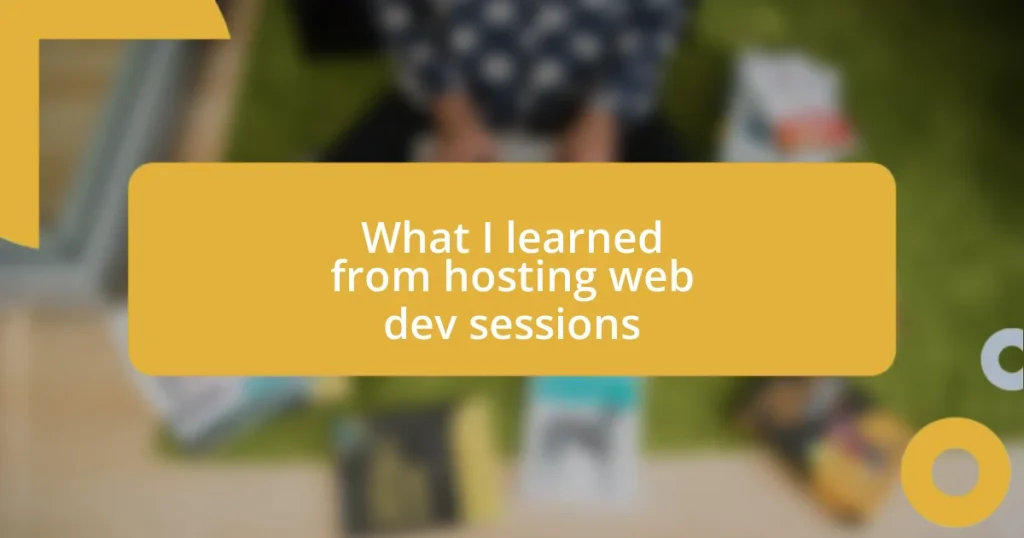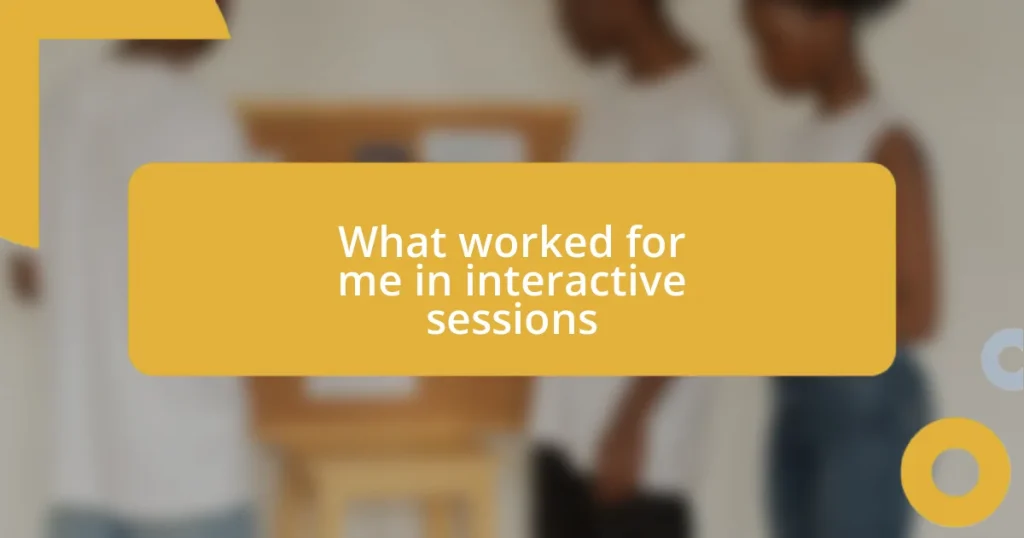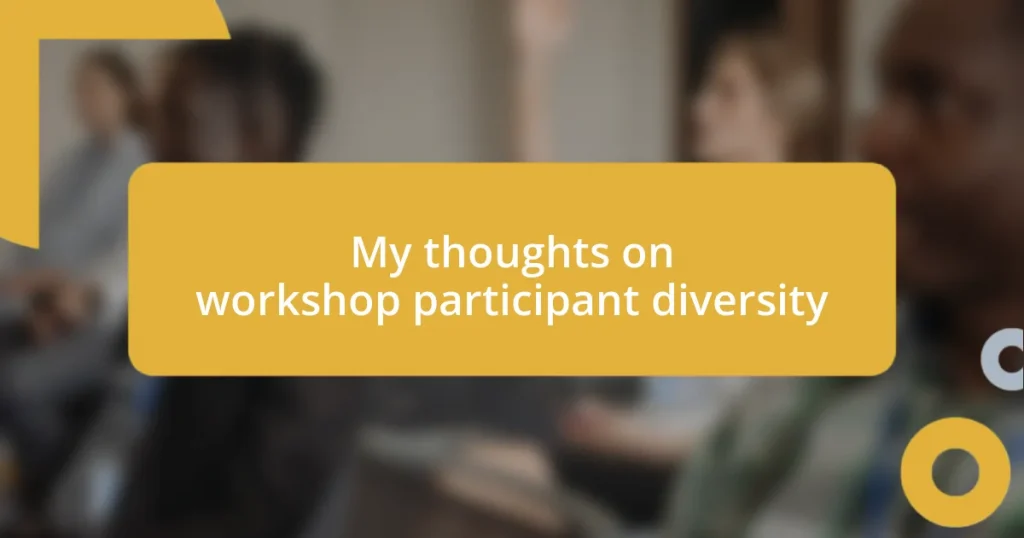Key takeaways:
- Offline networking fosters genuine connections through face-to-face interactions, leading to unexpected opportunities and meaningful relationships.
- Setting clear networking goals enhances the experience, guiding conversations and facilitating deeper connections with others in similar fields.
- Effective follow-up and measuring success through engagement quality and progression of relationships are crucial for maintaining connections made during networking events.

Understanding offline networking benefits
One of the most significant benefits of offline networking is the opportunity to create genuine connections. I remember attending a local business mixer where I struck up a conversation with a fellow entrepreneur. We both shared our struggles and successes, and by the end of the night, I not only had a new friend but also a valuable referral. Doesn’t it feel much more rewarding to forge these real-world relationships?
Face-to-face interactions allow for non-verbal cues, like smiles and handshakes, which are often absent in online networking. I’ve found that being able to read a person’s body language or express my enthusiasm through gestures can significantly enrich a conversation. How often do you find yourself relying on emojis to convey feelings online? This direct communication fosters trust and creates lasting impressions that help you stand out in people’s memories.
Moreover, offline networking often leads to unexpected opportunities. At a community event, I once casually mentioned my passion for writing to someone who turned out to be an editor looking for contributors. That chance encounter opened doors I hadn’t even considered before. Isn’t it exhilarating to know that sometimes the best opportunities arise when you least expect them?

Establishing clear networking goals
Establishing clear networking goals is essential for making the most of any offline event. I remember my first industry conference where I entered without a plan, simply hoping to meet interesting people. It wasn’t until a day later, feeling overwhelmed, that I realized I should have set specific objectives—whether to connect with mentors, explore partnerships, or expand my knowledge. Having clear goals makes it easier to navigate the buzz of the event and ensures I come away with meaningful connections rather than just a pile of business cards.
When I focus on my networking intentions, it transforms the experience. For instance, at a recent workshop, I aimed to find a collaborator for a project. This focus shifted my attention, leading me to a fellow attendee who shared similar interests. The conversation turned from small talk to brainstorming ideas, which ultimately resulted in a fruitful partnership. Setting goals not only makes conversations more purposeful, but it also encourages deeper connections—something I truly value in the networking process.
I find that writing down my networking goals ahead of time gives me clarity and boosts my confidence. It’s akin to preparing for a big presentation; the more I practice, the less daunting it feels. Each time I attend a networking event with clear objectives, I come home not just with contacts but with stories worth sharing. Isn’t it amazing how having a purpose can elevate an ordinary meeting into a memorable encounter?
| Type of Goal | Description |
|---|---|
| Connection | Building relationships with specific individuals or groups. |
| Collaboration | Finding potential partners for projects or ventures. |
| Learning | Seeking knowledge or insights from industry experts. |

Identifying relevant networking events
Identifying relevant networking events can sometimes feel overwhelming, especially in a bustling city full of opportunities. I recall browsing through endless lists of events, feeling both excited and unsure of where to invest my time. It’s essential to seek out events that align specifically with your interests or profession. By focusing on those that resonate with your own goals, you can maximize your chances of meaningful interactions.
To help you find events that will truly benefit you, consider these strategies:
- Industry Conferences: Look for conferences in your field that feature speakers or discussions on topics you’re passionate about.
- Local Meetups: Utilize platforms like Meetup.com to discover groups that focus on your interests or professional challenges.
- Community Workshops: Attend workshops that not only educate but also allow for networking with like-minded individuals.
- Alumni Events: Engage with local alumni gatherings from your university, as they often attract people who share similar experiences and backgrounds.
- Professional Association Meetings: These gatherings can provide invaluable networking opportunities with established professionals in your field.
When I make the effort to identify relevant networking events, I often find myself surrounded by people who share my enthusiasm. For instance, at a recent tech meetup, I met someone who was equally passionate about AI. Just a few hours into our conversation, we exchanged ideas that sparked new projects. It’s moments like these that remind me of the energy that comes from connecting with the right people in the right setting. Don’t hesitate to take your time sifting through different options—finding the perfect event could lead to your next significant opportunity!

Building meaningful relationships first
When I think about building meaningful relationships first, it all starts with being genuinely interested in others. I recall a networking dinner where I made a point to engage with attendees one-on-one—asking about their passions rather than just swapping professional histories. This shift in focus allowed me to create a real connection with a woman who shared her struggles and triumphs in her career; by the end of the night, we had forged a friendship that extended beyond just networking.
During a recent community event, I found myself speaking with a fellow attendee who had a completely different background from mine. Instead of rushing to pitch my own ideas, I asked her about her experiences and listened intently. The depth of her stories inspired me and made me realize that every person has something valuable to offer. That emotional connection made our conversation feel less transactional and more like a meaningful exchange. I often ask myself: how often do we truly listen in these settings, or are we too caught up in what we want to say next?
It’s fascinating how prioritizing genuine relationships can lead to unexpected opportunities. Last year at a small local gathering, I met someone who later became a crucial ally in my career. Our initial chat was about our favorite books, and in that relaxed atmosphere, we discovered shared goals and aspirations. That simple conversation evolved into regular catch-ups, strategic collaborations, and mutual support. It makes me wonder how many potential friendships—and career advancements—are waiting to blossom if we just take the time to nurture those connections.

Mastering effective communication skills
Effective communication skills are the heartbeat of any successful networking endeavor. I remember attending a workshop on public speaking where I learned the power of clarity and brevity. It struck me how important it is to convey thoughts in a straightforward manner while being aware of my audience’s reactions. Have you ever noticed how a simple nod or smile can encourage an ongoing dialogue? Engaging gestures can speak volumes—it’s all about making the other person feel heard and appreciated.
Listening is equally vital in mastering communication. During an informal gathering, I was chatting with a mentor who taught me a fundamental lesson: the art of truly hearing someone. Instead of thinking about my next response, I found myself absorbed in her story about career challenges. I realized that each person’s narrative is a treasure trove of insights waiting to be discovered. How often do we miss these nuggets when we’re focused on our own agenda?
Another aspect I’ve found indispensable is the ability to adapt my communication style to different personalities. At a recent networking event, I met a reserved individual who responded better to thoughtful questions rather than rapid-fire ones. By adjusting my approach, I created an environment where he felt comfortable sharing his experiences. This flexibility not only made our conversation more enjoyable but also deepened our connection. How might your conversations transform if you tuned into what others need from you, rather than just projecting your own message?

Following up after networking meetings
Reaching out after meeting someone can really solidify the connections you’ve just made. I once met a talented graphic designer at a seminar, and instead of waiting weeks to reconnect, I shot her a quick email the very next day. I reminded her of our discussion about our mutual love for sustainable design practices. That small gesture helped us establish a rapport; we soon began collaborating on projects, blending our expertise in exciting ways.
When it comes to following up, timing is key. I learned this the hard way—after a fantastic networking event, I procrastinated and sent my thank-you messages too late, diluting their impact. Since then, I always aim to send a warm message within 24 to 48 hours. I often share a thoughtful detail from our conversation, which shows that I truly valued our exchange. This not only keeps the conversation alive but also strengthens the bond we’ve created.
Using social media to follow up has been a game-changer for me. After meeting a fellow entrepreneur, I connected with him on LinkedIn and personalized my request with a fun reference to our shared interest in startups. It opened the door for ongoing conversations about our ventures and provided a platform for exchanging valuable resources. I ask myself: how can I leverage these digital tools to foster deeper relationships? It’s often about balancing the personal touch with the convenience of tech.

Measuring your networking success
Measuring the success of your networking efforts can be more straightforward than it seems. I always take a moment to reflect on the quality of my connections after an event. Did I engage in meaningful conversations? Were there any sparks of genuine interest? For me, if I walked away with new insights or opportunities, I consider that a win.
Another aspect I focus on is the follow-up responses I receive. After connecting with someone, I gauge the level of engagement in their replies. If they’re excited to collaborate or share further ideas, I know I’ve made an impact. This two-way exchange is crucial because it transforms a mere introduction into a lasting relationship. Have you ever felt that palpable energy in a conversation? That’s often a good indicator of potential success.
Lastly, I track how many connections I nurture into more significant interactions over time. For instance, after meeting a mentor at a conference, our lunch meetings evolved into coaching sessions. Watching this relationship grow fills me with a sense of accomplishment. How do you evaluate whether those initial networking seeds have taken root? Success lies in the conversations that follow and the collaborations they inspire.















